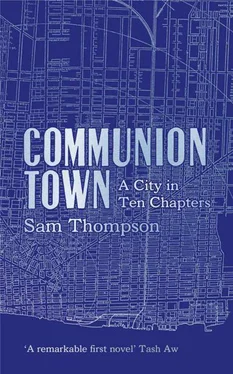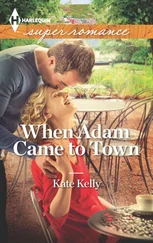And yet we became involved with each other. We became friends. Part of his trick was that he never calculated things, not consciously. It just happened that there was a sort of attractive chemistry between the two of us. He had an unsettling effect on me. When our hands brushed I got a jolt like a discharge of static. Once, in the union bar, he noticed it: he gasped stagily, fluttered his eyelashes, and breathed ‘we touched!’, mock-scandalised. I spent the rest of that evening angry with myself.
Does that get across the appeal we had for each other? It’s not that he was unkind. On the contrary, he took a fond interest, and he teased as if he knew I had a touch more potential in me than I was managing to show. I really think he would have been pleased if I had, one unforeseen day, struggled free of myself.
I knew that by one view of things I was only there to provide contrast. I was the one to whom life did not happen, admitted to Stephen’s world simply as audience to the spectacle of himself. I was the mark that measured the height of his ascent. Perhaps, but who’s to say that’s all there was to the story? I knew where I stood. Without the thrilling imbalance of unrequited admiration, it wouldn’t have been interesting. There would have been none of the singular intimacy that was understood between us, no matter that we never spoke about it, no matter that I would not see him for days or weeks at a time, often, or that when we passed in public he might or might not choose to notice me.
That was all part of our silent agreement. Much of the world he occupied must remain mysterious because, though he conveyed to me what he could, so much was predicated on my absence. He stood out brightly against me, and it was needful I should lack the knowledge even of what I was excluded from. What did he murmur into her translucent ear to make her laugh as I observed them across the dining hall? Where did he disappear to on the pale nights of the summer term, while I stayed awake until dawn, watching the street under my window for the shadow that never came slipping into Juno Square? I did not know but I cooperated with a will. It was fascination enough that, whatever he did, he was doing it, so to speak, in relation to me. What unknown and private spheres of experience I glimpsed. Or, I mean, I glimpsed nothing; it was purer than that. His experience began where mine ended, that much I knew.
Some things were clear enough. He favoured sullen, grungy, extremely good-looking girls, often with dreadlocks or lip-rings, long-bodied and slender, exquisitely dishevelled and taller than himself. These came and went on our staircase, and he never introduced them. I think they understood that they were passing through.
More opaque, as well as more lasting, was the clique with which he became involved. Now and then he would mention them by name and allude to what they did together, as if to mock the idea that I too was one of the group. Very occasionally, I would catch sight of him in their company out in the city. At least that’s what I thought I was seeing. I’d speculate about which names belonged to which of his associates, but I could never be sure, and of course I never approached. I was especially pleased with the time I spotted him lounging in the shadowy rear of a café along with a languid, scornful-looking, catlike young man and a near-identical girl. He had spoken about a pair of twins, Anna and Otto, and I was sure this must be them. For weeks afterwards I was plagued by the image of the three, leaning back together on the cushions, and often I thought I glimpsed the trio disappearing down a mews, or gaining admission at some unidentified entrance on the other side of a street; but always when the traffic cleared they were gone.
No doors were closed to him. If you were one of those who took him into the circle, if you saw yourself as an heir to the world, entitled by right of inheritance to the complex privileges, the sophisticated pleasures, the rich perversions reserved for the special children of this culture and its many centuries’ decadence; if you were one of those, you would look at Stephen and know that here was the youth equal to your requirements, a born member of your caste who would enter into all privilege, all extremity, without a flicker of discomposure and would keep the secrets which, if revealed, would surely have the small people, scandalised and choking with envy, hurling themselves at the throats of the great.
Is this unlikely? Is it improbable that among my contemporaries, in the very same streets and lecture theatres, some moved in a rare and secretive world? That they were on their way to the highest places, and were already delectating the rewards that were their due? I don’t know, but I’d be surprised if my imaginings have as much as rubbed the surface of what went on. I’d be more specific if I could. I can imagine more than I know how to put down in words, but what Stephen did when he was alone with his equals, what he saw and knew, I cannot begin to imagine.
We stopped seeing each other towards the end of our student days. I never understood quite why. With some people, shared experience drives you apart in the end; it teaches you that you don’t have so much in common after all, and the things you’ve said and done together become an embarrassment you don’t want to exacerbate. In any case, halfway through our final year he slipped out of focus for good. He became distracted and sour; he seemed disappointed. After our exams, we lost touch.
I stayed at the university and became a graduate student for a time, then found a job as an administrator in the department. Perhaps I stayed because I hadn’t finished with the place, or even, in truth, started with it. I was always waiting for the way to open up so that I could enter. Even good old Belltown, with its libraries and playing fields, its coffee shops and vegetarian restaurants, was a riddle I couldn’t quite solve. Crossing the park, I’d catch sight of the old bandstand as the rain was letting off. That was all it took to fill me with troubled desire. If I had been like Stephen I would have drained those years in a single draught, drained this whole city and skipped into the next escapade without a backward look, but instead I’ve stayed here at the edge of what I’ve never quite understood but which enthrals me the way it always did.
The city is a mystery when you notice it’s full of sunken side streets falling away from you beside river and canal, by yellow and pink brick terraces, in September for instance, under castles of foliage, in deep light. Someone approaches and you’re sure you recognise him, you’ve met just once, and not long ago, but he vanishes away down one of those streets and you miss him. You feel you owe an apology. And it only gets deeper, the riddle of it, as years go by and the special creatures stay exactly the same, just as they were when Stephen went with them. The modulation of names and faces makes no difference at all.
I didn’t expect to hear from Stephen again after that evening. I put the encounter down as another of his less than readable gestures, partly satiric, partly flattering, and not in the end for me to grasp. But then, one evening in late January, he turned up at my door.
I invited him into the flat and tripped over my own furniture as I followed him through. With him there I didn’t know where to stand. He waited for me to get around to offering him a cup of tea, then asked for coffee instead. He sat and watched while I got lost in my kitchen searching for the means to make it, and spilled the grounds across the counter.
But tonight there was an intermitted quality about him, a loose connection. One minute he was watching me, but the next he was gazing at his own linked hands on the kitchen table. I got the idea that he was ill at ease. I began to imagine that the surface of quick smiles and flirting glances had been hollowed out, and underneath was empty space, a vacuum tugging on his cheeks and eye-sockets. The lights were off in the living room next door, and the dark shapes of the furniture in there seemed to distract him. With this I noticed something else: it became clear that he had a reason for being here, as though we had agreed this meeting for some purpose so basic to us both that there was no need to go over it again. He hadn’t come to pass the time. He looked like someone who had stumbled, bedraggled and uninvited, into a birthday party to dismay the revellers.
Читать дальше
Конец ознакомительного отрывка
Купить книгу












